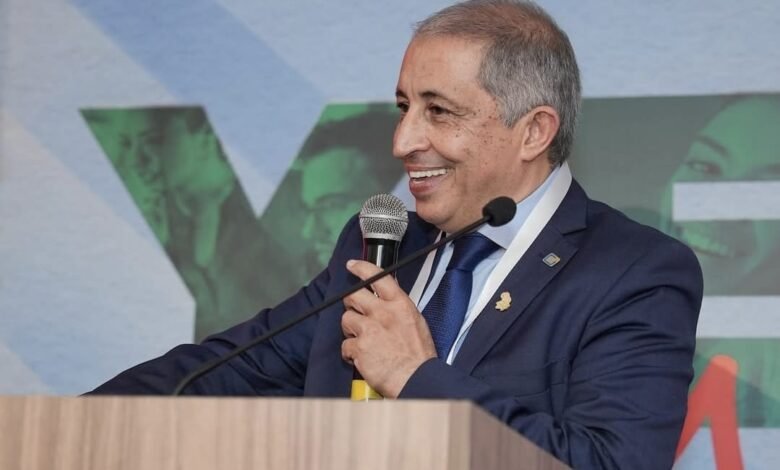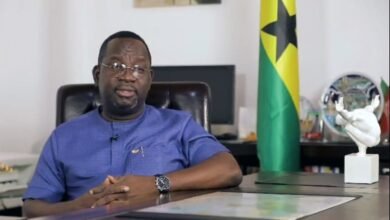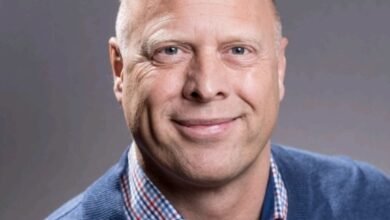Jadara: Empowering African Youth to Choose Their Future

“African youth is not a problem to solve; it is a solution to activate.” – Hamid BEN ELAFDIL, President of Jadara Foundation
Interview by Karima Rhanem, Senior Managing Editor
In this compelling interview, Hamid BEN ELAFDIL, President of the Jadara Foundation and former senior public official, shares the vision and driving force behind one of Morocco’s most impactful social mobility initiatives. Through programs targeting high-potential yet underserved youth—including NEETs—Jadara is shaping a new generation of changemakers across Africa. From systemic support and digital academies to deep-rooted alumni engagement, BEN ELAFDIL lays out how a holistic, locally grounded model can spark national and continental transformation.
As a man of action, entrepreneur, and former senior public official, what personally inspired you to create Jadara, and from what perspective?
“I myself come from a very modest background, which made me aware, from a young age, of a simple yet unforgiving reality: potential alone is not enough when the conditions are not in place. I was fortunate, at key moments in my life, to encounter people and opportunities that changed my trajectory. That awareness has never left me. What continues to move me deeply is witnessing so many brilliant, courageous, and determined young people held back—not by a lack of talent, but simply because they were not born in the right place or under the right conditions. My experience has taught me that public policies, strategies, and initiatives only bear real fruit when they are rooted in human and social reality. It is from this perspective that Jadara was born: a non-profit organization driven by the conviction that merit exists everywhere, but equity must be built. We sought to create a framework that is agile, structured, and deeply caring; one that empowers every young person to choose their future, rather than endure it.”

This year’s event focuses on youth, ambition, and social justice. What is the main message you want to convey through this edition, and how could it contribute to strengthening South-South cooperation in the youth sector?
“With over 70 million African youth classified as NEETs (Not in Education, Employment, or Training), the continent faces a major structural challenge. This ever-growing figure reflects a generation often marginalized, undervalued, yet full of immense potential. In the face of such urgency, diagnosis alone is not enough, we must act, hand in hand with those who know the field and are already providing solutions.
Across the continent, grassroots NGOs, citizen collectives, and youth themselves are launching innovative initiatives, tailored to local realities. These organizations—often underfunded and little-known—are in fact the closest to the population, the most agile, and the most capable of addressing the real needs of young people. This is precisely why Jadara Foundation launched YES Africa, with a clear vision: to place African NGOs at the heart of South-South cooperation by offering them a platform for visibility, dialogue, and co-creation. We believe the continent’s transformation will come first and foremost from African solutions, for African youth—shared, adapted, and amplified. It is the embodiment of King Mohammed VI’s call—may God assist him—for “Africa to trust Africa,” particularly in the realm of civil society.
YES Africa thus positions itself as a continental crossroads where NGOs, institutions, companies, experts, funders, and youth leaders come together to forge concrete partnerships. By enabling the circulation of best practices across countries, breaking silos, and investing in changemakers, South-South cooperation becomes a living, active force. YES Africa is not just an event; it is a movement that trusts African NGOs and equips them to act. In fact, over 7,670 hours of training in French, English, and Arabic have been delivered since April to the selected NGOs. Our message is clear: African youth is not a problem to solve; it is a solution to activate. YES Africa aims to be the catalyst for that activation.”

Over 3,000 young people have been supported since 2001. Do you consider these individual journeys as levers for broader societal transformation in Morocco?
“At Jadara, the support we offer is long-term, tailored to the path each young person chooses. This journey is far more than academic or financial assistance, it is one of personal transformation, where we instill strong values: perseverance, solidarity, responsibility, and leadership.
Each individual trajectory is a breakthrough. Our alumni have become engineers, entrepreneurs, professionals… But beyond their personal success, they have become role models, bridges, and changemakers in their communities. Many return as mentors, volunteers, or partners.
Jadara is helping to build a generation of engaged youth, rooted in their time, solution-oriented, and able to nourish Morocco’s social fabric. That is how these individual journeys, taken one by one, become levers for collective transformation. And that is how we contribute, in our own way, to a more just, inclusive, and youth-confident society.”

The “Réussir avec Jadara” program received over 26,000 applications this year. How do you identify hidden talent beyond grades or academic records? Why focus on NEETs? How do you support their integration in the digital and AI era?
“Our flagship program, “Réussir avec Jadara” is targeting high-achieving baccalaureate students from modest backgrounds. Each year, we launch a call for applications, receiving over 20,000 submissions yearly. Selection is based on a digital platform with a ranking algorithm that combines academic excellence with social vulnerability. This system allows us to accurately identify often-invisible talent by valuing both academic merit and the difficulty of their life circumstances. The NEETs fall under our “Nouvelle Chance Avec Jadara” program. These are young people who fall outside conventional educational paths. They are numerous, often forgotten, yet brimming with potential. We offer them short-term training—but always within a holistic approach. In the age of digital tools and AI, we combine technological solutions (e-learning, soft skills, language learning, guidance) with strong human presence: mentoring, psychological support, and coaching—for both groups. Because while technology helps us spot talent, it is human support that helps reveal it.”
You offer a very comprehensive approach: living scholarships, mentoring, coaching, soft skills, psychological support, language e-learning… Why such a global vision of support?
“The young people we support have one goal and face three major challenges. Their goal: to realize their potential and become active members of society. Their first challenge is financial, which we address through scholarships, laptops, insurance, and travel costs. The second is the gap in social or cultural capital, hence the language platforms, mentorship, company and museum visits, and personal development workshops. The third challenge, common to all youth, is building knowledge capital to meet the demands of a future still taking shape. That is why we partner with the best academic institutions and training providers. This holistic approach is the result of more than twenty years of experience, and it is what makes a sustainable and dignified social ascent possible.”
With a goal of 10,000 beneficiaries by 2030 and a focus on improving Morocco’s global mobility rankings, what levers will you activate to achieve this?
“To reach our target of 10,000 beneficiaries by 2030, we are first focusing on the development of strategic partnerships with public and private actors, both in Morocco and internationally. These alliances enable us to expand into new territories, notably through the scalable deployment of our Digital Academies, already underway in several regions of the Kingdom. In parallel, we are accelerating the digitalization of our educational pathways to reach more youth, including in remote areas. Lastly, we rely on a powerful organic lever: the growing engagement of our community. By combining innovation, proximity, and collective commitment, we aim to make our model scalable, equitable, and sustainable.”
The event brings together a variety of partners: companies, top schools, institutions, volunteers. What role does this ecosystem play in your impact model?
“The ecosystem convened by YES Africa lies at the very heart of our impact model. We believe no systemic change can occur in isolation. The summit acts as a platform for convergence among complementary actors: NGOs operate on the ground; companies bring industry expertise, employment pathways, and innovation; top universities contribute research, academic training, and global outlooks; public institutions provide legitimacy and policy continuity; donors activate vital financial mechanisms; and our volunteer experts infuse humanity, commitment, and generosity.
This network of engaged actors creates the collective intelligence needed to turn ambition into action, and isolated initiatives into continental momentum. That is the strength of YES Africa.
As of now, 293 African NGOs, 138 companies, 57 academic institutions, 47 public entities, 17 UN agencies, and 20 international donors have registered. All regions of Africa are represented: Southern Africa (5%), Central Africa (10%), East Africa (25%), West Africa (25%), and North Africa (35%).”
Your alumni—now entrepreneurs or executives—share powerful stories. How do you maintain a bond of loyalty between Jadara and its graduates?
“There is a deep emotional bond between the foundation and its former beneficiaries, born from sincere gratitude of having been supported at a decisive moment in their lives. This loyalty often translates into a natural willingness to “give back”, to pass on what they once received.
Our alumni return as volunteers, mentors, speakers, and partners, actively helping our community grow. We have built a structured alumni network, animated by events and shared learning opportunities.
Today, this dynamic is gaining new momentum through the development of a Jadara Alumni Club, a space to unite these passionate individuals around tangible, collective projects. More than a network, it is a living, engaged community, bound by the desire to give, to open doors, and to carry Jadara’s values forward through every shared success.”
Social mobility is broken in many countries. Do you believe Jadara’s model can be replicated elsewhere, or adapted to other regions of the Kingdom?
“Yes, and it must be. We regularly receive requests to replicate our model. Jadara’s model is structured, tested, and adaptable. It is built upon universal values: dignity, equal opportunity, and investment in human potential. What we have built in Morocco can inspire other regions, across Africa and beyond. Talent exists everywhere, support systems can be tailored to local contexts, and impact is measured at the human scale.”
Finally, if you could retain just one thing from this event—a look, a story, a word—what would you carry with you as motivation for what’s next?
“What I hope to take away from YES Africa is the look in the eyes of a young African who, for the very first time, feels they truly belong. That moment when they realize they are not alone, that they are part of something larger, and that their dreams are not only legitimate, but within reach. That gaze says everything: the pain of where they began, the strength of the path they’ve walked, and the light of what’s possible. It is that inner spark that we want to ignite through YES Africa, because when that gaze changes, a life opens up, and an entire continent begins to move again.”





